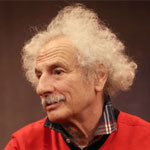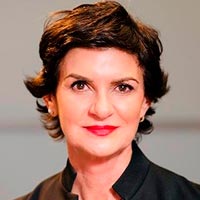Bachelor's Degree in Performing Arts
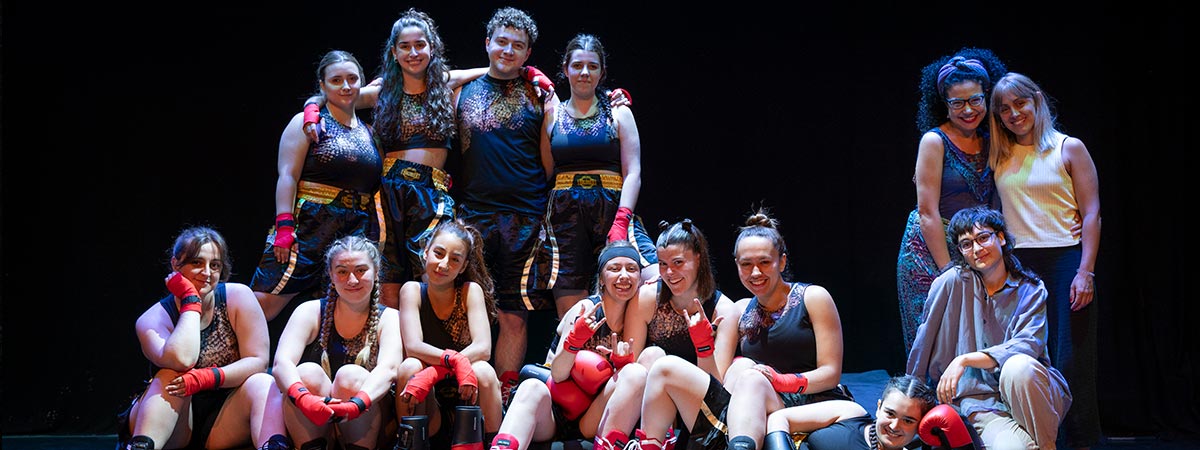
Innovative vision that goes beyond the traditional limits of Performing Arts
Nebrija University was one of the first institutions in Spain to offer a specialized university bachelor's degree in Dramatic Art, designed to train, at the university level, performing arts professionals in their role as actors, scriptwriters and stage directors. Acquiring skills in areas such as Art Direction, set design, production and audiovisual direction.
This exclusive Bachelor's Degree in Performing Arts offers students unique learning opportunities, opening a coherent path for their incorporation, through scriptwriting and dramatic texts, into the professional world of stage creation in theatre, cinema, television and multimedia creation.
The Bachelor's Degree in Performing Arts at Nebrija University trains students in all the essential resources to successfully represent different passages or theatrical modalities, both gestural and textual, as well as interpretation in front of television or film cameras. We do not train intellectually passive actors and actresses, but rather, through a solid humanist education, we train them to be capable of reading the dramatic text in depth, understanding its aesthetic and ideological content, analyzing it and teaching it to collaborate creatively in its staging through a broad base of solid artistic and conceptual knowledge.
Thanks to a renewed and updated curriculum, the student can develop his talent, imagination and professional training through practical workshop exercises and audiovisual projects. All this in a multidisciplinary environment and in close relationship with the students of the Degree in Audiovisual Communication. Our young actors, scriptwriters, stage creators, stage directors, producers and filmmakers will work as a team developing fascinating Scenic Creation projects such as short films, feature films, videos, stage productions, performances and multimedia creations.
In addition, you have the possibility to combine the Bachelor's Degree in Performing Arts with the Bachelor's Degree in Audiovisual Communication, a double degree that is unique in Spain and that reinforces employability.
"In a setting dedicated to fostering research and nurturing individual talent, it brings me immense joy to impart my professional and teaching expertise to our students. Guiding them through their personal and artistic development, witnessing their triumphs over challenges, and empowering them to shape their own destinies alongside our esteemed team of artistic mentors is truly gratifying."

Antonio Sierra Queimadelos Director of the Bachelor's Degree in Performing Arts
The actor and director of the National Classical Theatre Company, Lluís Homar, is the protagonist of a meeting with students of performing arts at the San Francisco de Sales Campus.
Double Degrees, double opportunities Combine your Degree in Performing Arts and obtain a Nebrija NextGen Talent Microcredential
What is the Nebrija NextGen Talent Microcredential?
Starting in the 2026/27 academic year, our Double Degrees will include this qualification, allowing our students to enrich their training and lead in an increasingly globalized world.
It consists of three essential elements:
From the 1st to the 4th year, there will be six work sessions of two and a half hours each, with expert guests from companies, media outlets, agencies, firms, and institutions to address topics such as:
- The most disruptive technological innovations
- New work methods and business models
- Deep Learning, Cognitive Science, Critical Thinking
- Global Affairs, Public Affairs
- New rights in the digital age
- Sustainability, Diversity, 2030 Agenda
Competencies:
- Global vision and critical thinking: abilities to design the future.
- Coherence and entrepreneurship: making the right decisions
- Teamwork and generosity: nurturing personal relationships
These six competencies will be assessed through an online assessment at the beginning of the program, providing each student with a personal development report. Based on that report, we will have two development sessions each year to create and monitor an action plan focusing on two competencies per year.
At the beginning of the fourth year, a new online assessment will allow us to measure each student’s personal improvement. In addition, it will offer guidance on the positions and sectors within the global market that best match their profile.
At the end of the Double Degree, students will participate in a one-week Study Tour at one of the following destinations:
- Montreal (McGill)
- Miami
- Boston (Babson College)
- Hong Kong
- Singapore
- Shanghai
Learn about our 80% Excellence Scholarships for these Double Degrees and benefit from an exclusive Mentoring Program.
Bachelor's Degree in Performing Arts in Spain that can be combined with other Bachelor's Degrees
Curriculum
BOCM-20251001-32 _BOCAM 234_Pag. 257
Our curriculum has been developed in accordance with the new guidelines set by current legislation, and has been verified by the National Agency for Quality Assessment and Accreditation.
The student must take 240 credits.
First year 60 ECTS
First Semester 30 ECTS- 6 ECTS | Theory and Interpretative Tools
- 6 ECTS | History of Theatre
- 6 ECTS | Music and Rhythm
- 6 ECTS | Stage Space and Physical Sensations
- 6 ECTS | Writing and Argumentation
Second Semester 30 ECTS- 6 ECTS | Vocal Technique
- 6 ECTS | Stage Practice
- 6 ECTS | Movement
- 6 ECTS | Stage Make-Up
- 6 ECTS | Digital Tools
Second year 60 ECTS
First Semester 30 ECTS- 6 ECTS | Creative Thinking
- 6 ECTS | Classical Theatre
- 6 ECTS | Theory of Performance
- 6 ECTS | Singing
- 6 ECTS | Stage Fighting
Second Semestar 30 ECTS- 6 ECTS | Choreography
- 6 ECTS | Musical Theatre
- 6 ECTS | Verse
- 6 ECTS | Communication Skills
- 6 ECTS | University Activities
Third year 60 ECTS
- 6 ECTS | Sound Space
- 6 ECTS | Performances
- 6 ECTS | Analysis of Dramatic Texts
- 6 ECTS | Stage Techniques and Styles
- 6 ECTS | Professional Competences
Second Semester 30 ECTS- 6 ECTS | Creation Workshop
- 6 ECTS | Actor Training
- 18 ECTS | Professional Internships
Fourth year 60 ECTS
First Semester 30 ECTS- 6 ECTS | Character Construction
- 6 ECTS | Acting in Front of the Camera
- 6 ECTS | Stage Direction and Acting
- 6 ECTS | Elective 1
- 6 ECTS | Final Project Workshop
Second Semester 30 ECTS- 6 ECTS | Stage Project
- 6 ECTS | Stage Speaking
- 6 ECTS | Elective 2
- 6 ECTS | Professional English
- 6 ECTS | Final Project
More information on these subjects
In accordance with Article 12.6 of R.D. 1393/2007, dated October 29, students may earn up to 6 academic credits for participating in cultural, sports, student representation, solidarity, or cooperative university activities.
Fourth year - First Semester
- 6 ECTS | Scenography and Lighting
- 6 ECTS | Transmedia Art
- 6 ECTS | Fashion Photography
- 6 ECTS | Content Creation: Social Media and Influence
- 6 ECTS | Corporate Identity and Brand Image
- 6 ECTS | Brand Communication
Fourth year - Second Semester
- 6 ECTS | Performing and Entertainment Trends
- 6 ECTS | Set Design and Art Direction
- 6 ECTS | Media, Art, and Culture
- 6 ECTS | Video Art
- 6 ECTS | Audio Narratives and Podcasts
- 6 ECTS | Fashion and Luxury Events
- 6 ECTS | Portfolio Design
It involves Communication and Emotional Intelligence, Teamwork, Project Management, Leadership and Negotiation, Development of professional competences (includes English level test)
- 6 ECTS | Communication, Emotional Intelligence and Teamwork Workshops
- 6 ECTS | Leadership, Negotiation and Project Management Workshops
- 6 ECTS | Professional Competences Development Workshops (includes English level test)
The recognition of 6 credits will be arranged according to the different activities that the student carries out throughout his/her degree. They will be awarded for cultural activities, sports, student representation, solidarity and cooperation, and/or to attend one of the following subjects: Ethics of volunteering or Human Rights.
A program whose objective is to favor the practical training of the students, under the continuous supervision of the Department of Professional Careers of the University, the academic department corresponding to the degree and the company or collaborating institution where the internships are carried out. We provide advice on the choice of internships and follow-up and tutoring, always considering the professional orientation of each student.
More information on Company Internships List of companies and institutions where the students of the degree have carried out internships under an educational cooperation agreementThe Final Research Project is an academic report that expounds on a subject of the curriculum and allows the assessment of the competences acquired in the Degree. It can be linked to professional internships or can also be part of a research project.
Nebrija University, which is committed to languages and quality, provides the student with added value with the Diploma in English Professional Communication, which will allow him/her to achieve with confidence the competence demanded to successfully join the labor market.
It corresponds to level C1.
More information herePrevious curriculum(to be extinguished)
BOE núm. 186, de 2 de agosto de 2010
Curriculum approved by Fundación Madrid in the 2019-2020 academic year, with implementation in 2020-2021
The student must take 240 credits
First Year 60 ECTS
- Curriculum in process of extinction
Second Year 60 ECTS
First Semester 30 ECTS- 6 ECTS | Foundations of Voice II
- 6 ECTS | Foundations of singing
- 6 ECTS | Classical Theater
- 6 ECTS | Literature and creation
- 6 ECTS | Movement: Acrobatics and stage fighting
Second Semester 30 ECTS- 6 ECTS | Body Education III
- 6 ECTS | Musical theatre
- 6 ECTS | Contemporary theater
- 6 ECTS | Vocal Technique II: Verse
- 6 ECTS | Development of Professional Competencies II
Third Year 60 ECTS
First Semester 30 ECTS- 6 ECTS | Reading and Analysis of Dramatic Texts
- 6 ECTS | Interpretation Techniques, Styles and Genres I
- 6 ECTS | Characterization
- 6 ECTS | Development of the Solidarity and Participatory Spirit
- 6 ECTS | Stage Speech
Second Semester 30 ECTS- 6 ECTS | Interpretation Techniques, Styles and Genres II
- 6 ECTS | Interpretation and Scenic Creation Workshop I
- 18 ECTS | Professional internships
Fourth Year 60 ECTS
First Semester 30 ECTS- 6 ECTS | Interpretation and Scenic Creation Workshop II
- 6 ECTS | Performing Arts Teaching
- 6 ECTS | Development of Professional Competencies III
- 6 ECTS | Interpretation in front of the camera
- 6 ECTS | Scenography and Art Direction
Second Semester 30 ECTS- 6 ECTS | Modern Languages
- 6 ECTS | Interpretation and Scenic Creation Projects
- 6 ECTS | Direction of actors
- 12 ECTS | Final Research Project
Professors
| Profesores Professors | Porcentaje de Doctores Percentage of PhD holders |
| 31 | 55% |
 Antonio Sierra Queimadelos
Director del Grado en Artes Escénicas / Profesor de Música y Ritmo y Fundamentos del Canto
Director of the Degree in Performing Arts / Professor of Music and Rhythm and Fundamentals of Singing
Licenciado en la Especialidad de Canto por el Real Conservatorio Superior de Música de Madrid; Diplomado como Cantante de Ópera y Conjunto Coral por la Escuela Superior de Canto de Madrid.
Asiste a diferentes Cursos Internacionales de Música y Canto. Desde 1996. Alterna su actividad artística como solista en diferentes Compañías Profesionales de Ópera, Zarzuela y Musicales, con la enseñanza universitaria.
Antonio Sierra Queimadelos
Director del Grado en Artes Escénicas / Profesor de Música y Ritmo y Fundamentos del Canto
Director of the Degree in Performing Arts / Professor of Music and Rhythm and Fundamentals of Singing
Licenciado en la Especialidad de Canto por el Real Conservatorio Superior de Música de Madrid; Diplomado como Cantante de Ópera y Conjunto Coral por la Escuela Superior de Canto de Madrid.
Asiste a diferentes Cursos Internacionales de Música y Canto. Desde 1996. Alterna su actividad artística como solista en diferentes Compañías Profesionales de Ópera, Zarzuela y Musicales, con la enseñanza universitaria.
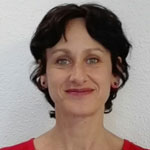 Mª Soledad Ardoy Solench
Profesora de Práctica escénica
Professor of Stage Practice
Marisol Ardoy es licenciada en interpretación y titulada en escenografía por la Real Escuela Superior de Arte Dramático de Madrid (RESAD). Máster en Artes Escénicas por la Universidad Rey Juan Carlos de Madrid. Amplía su formación asistiendo a cursos de danza, clown, improvisación, canto e interpretación. Desde 1990 desarrolla su actividad artística como actriz en diversas compañías profesionales de teatro, series de TV y cortometrajes. Actualmente es coordinadora de la actividad de teatro en el Liceo Francés, docente de interpretación en la empresa Hartford, la fundación Gotze y la fundación Vínculos y profesora de “Improvisación teatral y liderazgo” en la universidad de Nebrija.
Mª Soledad Ardoy Solench
Profesora de Práctica escénica
Professor of Stage Practice
Marisol Ardoy es licenciada en interpretación y titulada en escenografía por la Real Escuela Superior de Arte Dramático de Madrid (RESAD). Máster en Artes Escénicas por la Universidad Rey Juan Carlos de Madrid. Amplía su formación asistiendo a cursos de danza, clown, improvisación, canto e interpretación. Desde 1990 desarrolla su actividad artística como actriz en diversas compañías profesionales de teatro, series de TV y cortometrajes. Actualmente es coordinadora de la actividad de teatro en el Liceo Francés, docente de interpretación en la empresa Hartford, la fundación Gotze y la fundación Vínculos y profesora de “Improvisación teatral y liderazgo” en la universidad de Nebrija.
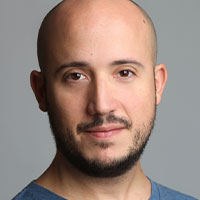 Alberto Basas García
Profesor de Taller de Interpretación y Creación Escénica II / Proyectos de Interpretación y Creación Escénica.
Professor of the Workshop on Interpretation and Stage Creation II / Projects on Interpretation and Stage Creation.
Actor, dramaturgo y director artístico. Fundador de ForoAsteros Teatro, con la que ha estrenado Hormigas en el alma (Premio del Público, Lerma 2021), Mintiendo su nombre (2020) y Quién se acordará (2023).
Dirige el Aula de Artes Escénicas del CMU Isabel de España y Fundación SEPI, donde ha impulsado montajes reconocidos como Que el tiempo cura (Premio Buero Vallejo, 2018), El otro lenguaje de las flores (Premio Asociación de CM de Madrid, 2024) y Fuente Obejuna, disección de un clásico (2016).
Como actor, ha trabajado en Los Figurantes (dir. José Sanchis Sinisterra), Banqueros vs zombis (dir. Pilar Almansa) y Los vivos y los míos (Premio de la crítica de El País, dir. Álvaro Tejero). En audiovisual ha participado en Campeón, la película (Hugo de la Riva) y la serie Libres (Álex Rodrigo).
Ha desarrollado proyectos de teatro comunitario con colectivos en situación de vulnerabilidad y una trayectoria pedagógica como profesor asociado en la Universidad Pontificia Comillas, además de impartir talleres y seminarios en universidades de España, Italia, Argentina y Guatemala.
Alberto Basas García
Profesor de Taller de Interpretación y Creación Escénica II / Proyectos de Interpretación y Creación Escénica.
Professor of the Workshop on Interpretation and Stage Creation II / Projects on Interpretation and Stage Creation.
Actor, dramaturgo y director artístico. Fundador de ForoAsteros Teatro, con la que ha estrenado Hormigas en el alma (Premio del Público, Lerma 2021), Mintiendo su nombre (2020) y Quién se acordará (2023).
Dirige el Aula de Artes Escénicas del CMU Isabel de España y Fundación SEPI, donde ha impulsado montajes reconocidos como Que el tiempo cura (Premio Buero Vallejo, 2018), El otro lenguaje de las flores (Premio Asociación de CM de Madrid, 2024) y Fuente Obejuna, disección de un clásico (2016).
Como actor, ha trabajado en Los Figurantes (dir. José Sanchis Sinisterra), Banqueros vs zombis (dir. Pilar Almansa) y Los vivos y los míos (Premio de la crítica de El País, dir. Álvaro Tejero). En audiovisual ha participado en Campeón, la película (Hugo de la Riva) y la serie Libres (Álex Rodrigo).
Ha desarrollado proyectos de teatro comunitario con colectivos en situación de vulnerabilidad y una trayectoria pedagógica como profesor asociado en la Universidad Pontificia Comillas, además de impartir talleres y seminarios en universidades de España, Italia, Argentina y Guatemala.
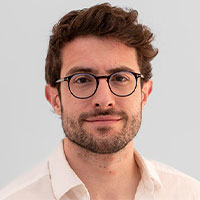 Fernando Bonete Vizcaíno
Profesor de Escritura y Argumentación
Professor of Writing and Argumentation
Doctor en Comunicación Social y profesor contratado doctor (ANECA). En redes sociales es uno de los divulgadores digitales más importantes de España. Su cuenta de Instagram @en_bookle reúne a más de 400.000 personas en torno a la cultura y la literatura. Es colaborador habitual de diversos medios de comunicación y su trabajo ha sido reconocido con el Premio EDE Literatura 2022 y el Premio Lolo de Periodismo 2023. Ha publicado decenas de investigaciones en revistas científicas y libros de alcance nacional e internacional, y ha formado parte de proyectos de investigación para instituciones y medios de comunicación como el Observatorio Digital de Medios de la Comisión Europea, el Ministerio de Ciencia e Innovación, Atresmedia Corporación, RTVE, ZDF, France24 y Santander Universities. Con anterioridad ha ocupado cargos de gestión académica como director del Grado en Humanidades de la Universidad CEU San Pablo y director del Máster en Economía Circular y Desarrollo Sostenible de la Escuela de Unidad Editorial. Graduado en Humanidades y en Periodismo, y licenciado en Música, especialidad de Violín, por el Real Conservatorio Superior de Música de Madrid, ha completado su formación con el Máster Universitario en Formación para Profesorado, y el Título de Experto Universitario en Gestión y Desarrollo de Aplicaciones Web.
Fernando Bonete Vizcaíno
Profesor de Escritura y Argumentación
Professor of Writing and Argumentation
Doctor en Comunicación Social y profesor contratado doctor (ANECA). En redes sociales es uno de los divulgadores digitales más importantes de España. Su cuenta de Instagram @en_bookle reúne a más de 400.000 personas en torno a la cultura y la literatura. Es colaborador habitual de diversos medios de comunicación y su trabajo ha sido reconocido con el Premio EDE Literatura 2022 y el Premio Lolo de Periodismo 2023. Ha publicado decenas de investigaciones en revistas científicas y libros de alcance nacional e internacional, y ha formado parte de proyectos de investigación para instituciones y medios de comunicación como el Observatorio Digital de Medios de la Comisión Europea, el Ministerio de Ciencia e Innovación, Atresmedia Corporación, RTVE, ZDF, France24 y Santander Universities. Con anterioridad ha ocupado cargos de gestión académica como director del Grado en Humanidades de la Universidad CEU San Pablo y director del Máster en Economía Circular y Desarrollo Sostenible de la Escuela de Unidad Editorial. Graduado en Humanidades y en Periodismo, y licenciado en Música, especialidad de Violín, por el Real Conservatorio Superior de Música de Madrid, ha completado su formación con el Máster Universitario en Formación para Profesorado, y el Título de Experto Universitario en Gestión y Desarrollo de Aplicaciones Web.
 Natalia Calderón Sergio
Profesora de Teatro Musical
Professor of Musical theatre
Cantante, actriz, coach vocal, directora de coro y productora teatral. Doctoranda en Estudios teatrales por la UCM. Grado Superior en Jazz, especialidad Voz, por el Conservatorio Superior de Música del País Vasco, Musikene. Licenciada en Publicidad y RRPP por la UCM. Máster en Patología de la Voz y Voz Profesional por la UAH. Compositora y letrista en proyectos musicales y teatrales como 27 Espectáculo Poético Musical, Ilusia, La Calderona, Natalia Calderón Quartet o GrooveBox, entre otros. Formada en Voice Craft, técnica Brilla & Paglin, Lax Vox, Michael Chekhov Technique y Euritmia.
Natalia Calderón Sergio
Profesora de Teatro Musical
Professor of Musical theatre
Cantante, actriz, coach vocal, directora de coro y productora teatral. Doctoranda en Estudios teatrales por la UCM. Grado Superior en Jazz, especialidad Voz, por el Conservatorio Superior de Música del País Vasco, Musikene. Licenciada en Publicidad y RRPP por la UCM. Máster en Patología de la Voz y Voz Profesional por la UAH. Compositora y letrista en proyectos musicales y teatrales como 27 Espectáculo Poético Musical, Ilusia, La Calderona, Natalia Calderón Quartet o GrooveBox, entre otros. Formada en Voice Craft, técnica Brilla & Paglin, Lax Vox, Michael Chekhov Technique y Euritmia.
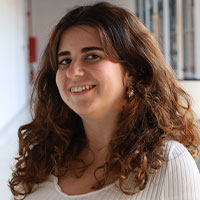 Ana García Cabañas
Profesora de Desarrollo del espíritu participativo y solidario: Clubes
Professor of Development of the Participatory and Solidarity Spirit: Club
Graduada en Periodismo (Universidad Complutense de Madrid) y Máster en Marketing Digital y Redes Sociales (UDIMA). Coordinadora de Clubes y Objetivos de Desarrollo Sostenible en la Fundación Nebrija y Coordinadora del Club de Voluntariado, en el que se desarrollan distintos proyectos de voluntariado con ONGs e Instituciones: Cruz Roja, Nadiesolo, Helsinki España o Fundación Telefónica entre otras.
Ana García Cabañas
Profesora de Desarrollo del espíritu participativo y solidario: Clubes
Professor of Development of the Participatory and Solidarity Spirit: Club
Graduada en Periodismo (Universidad Complutense de Madrid) y Máster en Marketing Digital y Redes Sociales (UDIMA). Coordinadora de Clubes y Objetivos de Desarrollo Sostenible en la Fundación Nebrija y Coordinadora del Club de Voluntariado, en el que se desarrollan distintos proyectos de voluntariado con ONGs e Instituciones: Cruz Roja, Nadiesolo, Helsinki España o Fundación Telefónica entre otras.
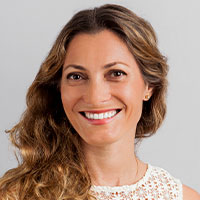 Marta Gómez Blanco
Profesora de Lenguas Modernas
Professor of Modern Languages
Licenciada en Filología Inglesa por la Universidad de Deusto. Máster en pedagogía humanística Waldorf por la Fundación Antroposófica Waldorf. Cuenta con una amplia experiencia en el ámbito docente. Ha enseñado español, inglés, cultura e historia anglosajona, alemán, euskera, artes, música (canto) y locución, en centros de formación, academias y colegios. Especializada en trabajo pedagógico con la metodología de la enseñanza Waldorf desde el jardín de infancia, primaria y secundaria. Cuenta con certificados oficiales que acreditan su maestría en dominio de inglés (EOI), (CPE) y alemán (PNDS). Posee su máster en capacitación profesional (CAP) por la Universidad de Deusto. Actualmente imparte asignaturas de grado en la Universidad Nebrija en Competencias Profesionales – Competencias Comunicativas Inglés y Castellano. Colabora como profesora de inglés para el cuerpo docente de la Universidad UAX. Está interesada en la música (cantante de jazz con discos publicados), y en el doblaje, locución, publicidad radiofónica y grabación de audiolibros, otro ámbito profesional. Habla inglés, español, alemán, euskera y danés.
Marta Gómez Blanco
Profesora de Lenguas Modernas
Professor of Modern Languages
Licenciada en Filología Inglesa por la Universidad de Deusto. Máster en pedagogía humanística Waldorf por la Fundación Antroposófica Waldorf. Cuenta con una amplia experiencia en el ámbito docente. Ha enseñado español, inglés, cultura e historia anglosajona, alemán, euskera, artes, música (canto) y locución, en centros de formación, academias y colegios. Especializada en trabajo pedagógico con la metodología de la enseñanza Waldorf desde el jardín de infancia, primaria y secundaria. Cuenta con certificados oficiales que acreditan su maestría en dominio de inglés (EOI), (CPE) y alemán (PNDS). Posee su máster en capacitación profesional (CAP) por la Universidad de Deusto. Actualmente imparte asignaturas de grado en la Universidad Nebrija en Competencias Profesionales – Competencias Comunicativas Inglés y Castellano. Colabora como profesora de inglés para el cuerpo docente de la Universidad UAX. Está interesada en la música (cantante de jazz con discos publicados), y en el doblaje, locución, publicidad radiofónica y grabación de audiolibros, otro ámbito profesional. Habla inglés, español, alemán, euskera y danés.
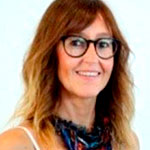 Raquel Gómez Gónzalez
Profesora de Desarrollo de competencias profesionales II
Professor of Development of professional skills II
Licenciada en Psicología por la UCM, Máster en RRHH por el Centro de Estudios y Formación Empresarial Garrigues & Andersen, Coach Certificada por AECOP Y EMCC, y Licensed Master Practitioner of Neuro-Linguistic Programming (PNL). Más de 15 años trabajando con el capital humano de las organizaciones, tanto en selección y contratación, como en formación, me han enseñado que lo que hace que alguien destaque es su actitud y capacidad para gestionar situaciones complejas. Actualmente Coordinadora y Formadora del Instituto Nebrija de Competencias Profesionales, comparto con los alumnos mi experiencia, para que entrenen y desarrollen las competencias y habilidades que el futuro profesional les va a exigir para alcanzar el éxito.
Raquel Gómez Gónzalez
Profesora de Desarrollo de competencias profesionales II
Professor of Development of professional skills II
Licenciada en Psicología por la UCM, Máster en RRHH por el Centro de Estudios y Formación Empresarial Garrigues & Andersen, Coach Certificada por AECOP Y EMCC, y Licensed Master Practitioner of Neuro-Linguistic Programming (PNL). Más de 15 años trabajando con el capital humano de las organizaciones, tanto en selección y contratación, como en formación, me han enseñado que lo que hace que alguien destaque es su actitud y capacidad para gestionar situaciones complejas. Actualmente Coordinadora y Formadora del Instituto Nebrija de Competencias Profesionales, comparto con los alumnos mi experiencia, para que entrenen y desarrollen las competencias y habilidades que el futuro profesional les va a exigir para alcanzar el éxito.
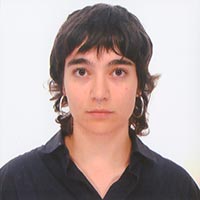 Antía Gómez Ortega (Antía Goyene)
Profesora de Espacio Escénico y Sensaciones Físicas
Professor of Performing Arts and Physical Sensations
Graduada en Artes Escénicas y Comunicación Audiovisual por la Universidad Antonio de Nebrija. Con más de diez años de formación en danza. Ha desarrollado proyectos propios como “21 Almas en Movimiento”; o “La Metamorfosis de las Ninfas”, actualmente programada en el ciclo BODY TALK VI (2025), de AÏS. Ha participado como intérprete en proyectos como “Dancetería” o “Cult” (2024), de Davo Bezares. Y actualmente es actriz en “Vaciada”, una adaptación contemporánea de “Yerma”, que se estrenará en octubre de 2025. Ha trabajado de ayudante de dirección con directoras como Luna Paredes, Pepa Pedroche, Nerea Lovecchio o Mariana Carballal. Ha impartido talleres de Educación Corporal, en varias ocasiones y ha propulsado la creación de “Dadaneras” (2024): un grupo-laboratorio que explora desde lo colectivo, probando dinámicas y metodologías propias.
Antía Gómez Ortega (Antía Goyene)
Profesora de Espacio Escénico y Sensaciones Físicas
Professor of Performing Arts and Physical Sensations
Graduada en Artes Escénicas y Comunicación Audiovisual por la Universidad Antonio de Nebrija. Con más de diez años de formación en danza. Ha desarrollado proyectos propios como “21 Almas en Movimiento”; o “La Metamorfosis de las Ninfas”, actualmente programada en el ciclo BODY TALK VI (2025), de AÏS. Ha participado como intérprete en proyectos como “Dancetería” o “Cult” (2024), de Davo Bezares. Y actualmente es actriz en “Vaciada”, una adaptación contemporánea de “Yerma”, que se estrenará en octubre de 2025. Ha trabajado de ayudante de dirección con directoras como Luna Paredes, Pepa Pedroche, Nerea Lovecchio o Mariana Carballal. Ha impartido talleres de Educación Corporal, en varias ocasiones y ha propulsado la creación de “Dadaneras” (2024): un grupo-laboratorio que explora desde lo colectivo, probando dinámicas y metodologías propias.
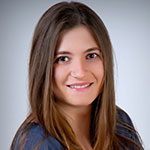 Paula Grueso Pascual
Profesora de Interpretación delante de la Cámara
Professor of Interpretation in front of the camera
Doctora Cum Laude en Estudios Teatrales y Máster en Teatro y Artes Escénicas por la Universidad Complutense de Madrid. Graduada en Comunicación Audiovisual por la Universidad de Valencia y en Psicología por la UNED. Ha cursado estudios de Interpretación en escuelas como La Escalante de Valencia, el Centro de Nuevos Creadores en Madrid y la Universidad Internacional de Andalucía. Su experiencia profesional ha versado entre el teatro y el audiovisual, como actriz, auxiliar de producción, ayudante de dirección, operadora de cámara y diseñadora y técnico de luces y sonido. Actualmente, compagina la docencia con la investigación en el ámbito del audiovisual y la práctica de la psicología de corte educativa.
Paula Grueso Pascual
Profesora de Interpretación delante de la Cámara
Professor of Interpretation in front of the camera
Doctora Cum Laude en Estudios Teatrales y Máster en Teatro y Artes Escénicas por la Universidad Complutense de Madrid. Graduada en Comunicación Audiovisual por la Universidad de Valencia y en Psicología por la UNED. Ha cursado estudios de Interpretación en escuelas como La Escalante de Valencia, el Centro de Nuevos Creadores en Madrid y la Universidad Internacional de Andalucía. Su experiencia profesional ha versado entre el teatro y el audiovisual, como actriz, auxiliar de producción, ayudante de dirección, operadora de cámara y diseñadora y técnico de luces y sonido. Actualmente, compagina la docencia con la investigación en el ámbito del audiovisual y la práctica de la psicología de corte educativa.
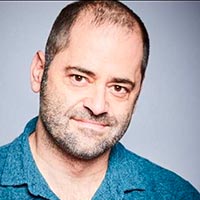 Nicolas Ibañez Alegría
Profesor de Habla escénica
Professor of Stage Speech
Profesor de canto lírico, teatro musical, técnica vocal, habla escénica, voz hablada profesional, con más de 20 años de experiencia en diferentes centros superiores. Compagina su labor docente con la profesional como barítono, llevando a cabo recitales de ópera, zarzuela y canción de concierto.
Nicolas Ibañez Alegría
Profesor de Habla escénica
Professor of Stage Speech
Profesor de canto lírico, teatro musical, técnica vocal, habla escénica, voz hablada profesional, con más de 20 años de experiencia en diferentes centros superiores. Compagina su labor docente con la profesional como barítono, llevando a cabo recitales de ópera, zarzuela y canción de concierto.
 Nerea Lovecchio Estalayo
Profesora de Teatro contemporáneo; Técnicas, estilos y géneros de interpretación I
Professor of Contemporary theater; Techniques, styles and genres of interpretation I
Doctora Cum Laude en Artes Escénicas y Cine en la Universidad de Valladolid, departamento de Historia Moderna y contemporánea, facultad de Filosofía y Letras. Tesis: Del vacío a la creación: Cine, dramaturgia y expresión corporal como aproximación hacia la verdad ante un hecho traumático. Por la Universidad de Valladolid. Creadora de la técnica de entrenamiento corporal Los 4 vacíos. Especialista en Interpretación y técnicas físicas para el trabajo del actor combinando conocimientos teórico-prácticos de las Artes Escénicas. Experiencia docente e investigadora en el Teatro Tyl Tyl, Odin Teatret (Dinamarca), Universidad de Valladolid, Hunter College y T.Schriber Studios (New York). Guionista y actriz en el largometraje “Moira” que se estrenará a finales de este año 2019 en cines de ámbito nacional. Trabajo en series de televisión como “La pecera de Eva” (Telecinco) o “Centro médico” (TVE). Directora, guionista y actriz de producciones teatrales entre las que destacan “Entre Yo y Yo”; “Sí y además”; “Boxes” y “Enselvados”, algunas de ellas han formado parte de la programación del festival Surge Madrid.
Nerea Lovecchio Estalayo
Profesora de Teatro contemporáneo; Técnicas, estilos y géneros de interpretación I
Professor of Contemporary theater; Techniques, styles and genres of interpretation I
Doctora Cum Laude en Artes Escénicas y Cine en la Universidad de Valladolid, departamento de Historia Moderna y contemporánea, facultad de Filosofía y Letras. Tesis: Del vacío a la creación: Cine, dramaturgia y expresión corporal como aproximación hacia la verdad ante un hecho traumático. Por la Universidad de Valladolid. Creadora de la técnica de entrenamiento corporal Los 4 vacíos. Especialista en Interpretación y técnicas físicas para el trabajo del actor combinando conocimientos teórico-prácticos de las Artes Escénicas. Experiencia docente e investigadora en el Teatro Tyl Tyl, Odin Teatret (Dinamarca), Universidad de Valladolid, Hunter College y T.Schriber Studios (New York). Guionista y actriz en el largometraje “Moira” que se estrenará a finales de este año 2019 en cines de ámbito nacional. Trabajo en series de televisión como “La pecera de Eva” (Telecinco) o “Centro médico” (TVE). Directora, guionista y actriz de producciones teatrales entre las que destacan “Entre Yo y Yo”; “Sí y además”; “Boxes” y “Enselvados”, algunas de ellas han formado parte de la programación del festival Surge Madrid.
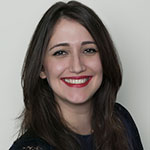 Claudia Malheiros Munhoz
Profesora de Literatura y creación y Lectura y análisis de textos dramáticos
Professor of Literature and creation and Reading and analysis of dramatic texts
Ha realizado sus estudios de grado (UNICAMP) y de Máster (UCM) en Estudios Literarios, y es Doctora en Literatura Comparada por la Universidad Complutense de Madrid. Profesora de Literatura, Historia del cine y de Estética Cinematográfica (TAI) es también investigadora postdoctoral en Literatura Comparada en Brasil (UEL), donde también imparte clases como Profesora Visitante. En sus investigaciones aborda temas como las escrituras del Yo, la influencia de la Biblia en el Teatro del Absurdo y la relación entre Arte, Cine y Literatura. Ha participado en diversos proyectos en los tres ámbitos, como exposiciones de arte y festivales de cine, además de colaborar en algunas obras. Es miembro del Grupo de Investigación Voces Africanas (GIVA), y editora en las revistas Discursos Fotográficos de la UEL, que recoge materiales de carácter científico sobre artes visuales, y Africanías. Revista de Literaturas, enfocada en los estudios literarios sobre el continente africano, su diáspora y la afrodescendencia.
Claudia Malheiros Munhoz
Profesora de Literatura y creación y Lectura y análisis de textos dramáticos
Professor of Literature and creation and Reading and analysis of dramatic texts
Ha realizado sus estudios de grado (UNICAMP) y de Máster (UCM) en Estudios Literarios, y es Doctora en Literatura Comparada por la Universidad Complutense de Madrid. Profesora de Literatura, Historia del cine y de Estética Cinematográfica (TAI) es también investigadora postdoctoral en Literatura Comparada en Brasil (UEL), donde también imparte clases como Profesora Visitante. En sus investigaciones aborda temas como las escrituras del Yo, la influencia de la Biblia en el Teatro del Absurdo y la relación entre Arte, Cine y Literatura. Ha participado en diversos proyectos en los tres ámbitos, como exposiciones de arte y festivales de cine, además de colaborar en algunas obras. Es miembro del Grupo de Investigación Voces Africanas (GIVA), y editora en las revistas Discursos Fotográficos de la UEL, que recoge materiales de carácter científico sobre artes visuales, y Africanías. Revista de Literaturas, enfocada en los estudios literarios sobre el continente africano, su diáspora y la afrodescendencia.
 Alfonso Mendiguchía Hernández
Profesor de Dirección de actores
Professor of Direction of actors
Doctor en Comunicación por la Universidad Pontificia de Salamanca. Licenciado en Ciencias de la información por la UPSA. Estudios de Doblaje en la academia AM (Madrid). Cursos de voz, verso, dirección e interpretación con profesores como Alfonso Romera, Dennis Rafter, Lluís Pascual...Ha sido miembro fundador de las compañías ‘La Máscara’, ‘Malagüero teatro’, ‘Capicúa’, ‘Intrussion’, ‘trío de ases’ y ‘Los absurdos teatro’. Como actor de teatro ha estrenado más de cincuenta espectáculos tanto de sala como de calle con sus propias compañías y con otras como ‘Feelgood’, ‘Proyecto 43-2’, ‘Mosaico Mercurio’, ‘La Troupe’, ‘calle 11’, ‘S.A.C.’, ‘La Radical’ o ‘La partida’. En televisión ha participado como actor en series como 7vidas, Aida, La familia mata, Hispania, Sin tetas no hay paraíso, Doctor Mateo, Los exitosos Peels, Ascensores, Cuéntame, La que se avecina, Los Serrano, SMS, Yo soy Bea, 90-60-90, Cuestión de Sexo, LEX, Luna (el misterio de Calenda), Águila Roja, Amar es para siempre, El secreto de Puente Viejo, El incidente, Bajo Sospecha, Acacias 38, Centro Médico, además de en una treintena de campañas publicitarias.
Alfonso Mendiguchía Hernández
Profesor de Dirección de actores
Professor of Direction of actors
Doctor en Comunicación por la Universidad Pontificia de Salamanca. Licenciado en Ciencias de la información por la UPSA. Estudios de Doblaje en la academia AM (Madrid). Cursos de voz, verso, dirección e interpretación con profesores como Alfonso Romera, Dennis Rafter, Lluís Pascual...Ha sido miembro fundador de las compañías ‘La Máscara’, ‘Malagüero teatro’, ‘Capicúa’, ‘Intrussion’, ‘trío de ases’ y ‘Los absurdos teatro’. Como actor de teatro ha estrenado más de cincuenta espectáculos tanto de sala como de calle con sus propias compañías y con otras como ‘Feelgood’, ‘Proyecto 43-2’, ‘Mosaico Mercurio’, ‘La Troupe’, ‘calle 11’, ‘S.A.C.’, ‘La Radical’ o ‘La partida’. En televisión ha participado como actor en series como 7vidas, Aida, La familia mata, Hispania, Sin tetas no hay paraíso, Doctor Mateo, Los exitosos Peels, Ascensores, Cuéntame, La que se avecina, Los Serrano, SMS, Yo soy Bea, 90-60-90, Cuestión de Sexo, LEX, Luna (el misterio de Calenda), Águila Roja, Amar es para siempre, El secreto de Puente Viejo, El incidente, Bajo Sospecha, Acacias 38, Centro Médico, además de en una treintena de campañas publicitarias.
 Victoria Isabel Moreno Gil
Profesora de Prácticas profesionales
Professor of Professional Internships
Doctora Cum Laude en Investigación en Medios de Comunicación por la Universidad Carlos III de Madrid, máster en Derecho de la información por la UNED y licenciada en Periodismo y Comunicación Audiovisual por la Universidad Carlos III de Madrid. Profesora asociada en la Universidad Nebrija desde 2019 y en la Universidad Carlos III de Madrid desde 2022. Sus líneas de investigación son la ética periodística, la desinformación, la alfabetización mediática y la Inteligencia Artificial. Combina su labor docente e investigadora con una dilatada carrera profesional como periodista (El Mundo TV, Intereconomía, Cadena Ser). Actualmente trabaja como redactora multimedia en la European Pressphoto Agency (EPA), ligada a la Agencia EFE.
Victoria Isabel Moreno Gil
Profesora de Prácticas profesionales
Professor of Professional Internships
Doctora Cum Laude en Investigación en Medios de Comunicación por la Universidad Carlos III de Madrid, máster en Derecho de la información por la UNED y licenciada en Periodismo y Comunicación Audiovisual por la Universidad Carlos III de Madrid. Profesora asociada en la Universidad Nebrija desde 2019 y en la Universidad Carlos III de Madrid desde 2022. Sus líneas de investigación son la ética periodística, la desinformación, la alfabetización mediática y la Inteligencia Artificial. Combina su labor docente e investigadora con una dilatada carrera profesional como periodista (El Mundo TV, Intereconomía, Cadena Ser). Actualmente trabaja como redactora multimedia en la European Pressphoto Agency (EPA), ligada a la Agencia EFE.
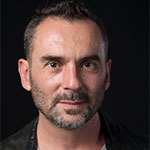 Carlos Moya Rodríguez
Profesor de Técnica vocal y Fundamentos de la Voz II
Professor of Vocal Technique y Fundamentals of voice II
CVDoctor “Cum Laude” en Estudios Teatrales por la Universidad Complutense de Madrid (Línea de investigación de Antropología Teatral) y Titulado superior en Interpretación Teatral por la RESAD (Madrid), Carlos Moya profundiza en el estudio de la voz de la mano de Vicente Fuentes, y posteriormente en el Roy Hart Center International, con maestros como Pascale Ben o Laurent Stephan, cuya técnica se basa en el descubrimiento del sonido del propio cuerpo, la vibración del instrumento que somos cada uno de nosotros.
Profesor de Técnica Vocal y Expresión Oral en el Grupo de Teatro de la Universidad Carlos III de Madrid, desde el año 2002 hasta el año 2015, incide en el trabajo físico, la imaginación y la energía individual. A través de la respiración y el conocimiento del propio cuerpo, llega a encontrar el sonido individual.
Licenciado en C.C. Políticas y Sociología, sección Sociología, en la especialidad de Antropología Social por la Universidad Complutense de Madrid. En 1998 amplía estudios con una beca Erasmus en Perugia, Italia, sobre Antropología Teatral. Allí participa en el laboratorio teatral internacional Human Beings como actor, y comenzará su andadura como profesor de Voz.
Como actor, destacan sus papeles de El profesor en “La Lección” (2023), Yago en “Othello” (2019), Padre Leocadio, en “La tetera” (2018), Personaje A, en “Mercado libre” (2017), Marcelino, en “Maribel y la extraña familia” (2016) y Horacio en “Hamlet” (2012).
Como director, ha dirigido “La Lección” (2023), “La tetera” (2017) y “La Cantante Calva” (2014) (Cía. 3Tris Teatro), “Mercado libre” (2016) (Cía. Parafernalias), “El hombre de la flor en boca” (2015) (Cía. Teseo) y “Aguachirly” (2006) (Aula de las Artes de la UC3).
Ha participado en diversos cortometrajes y trabajado en publicidad (BBVA, Muy Interesante, Banco Popular, Ikea, Jazztel, Mapfre) y en Ficción (“La que se avecina”, “Cuéntame”).
Actualmente combina su labor investigadora y docente con la profesional como actor y director.
Carlos Moya Rodríguez
Profesor de Técnica vocal y Fundamentos de la Voz II
Professor of Vocal Technique y Fundamentals of voice II
CVDoctor “Cum Laude” en Estudios Teatrales por la Universidad Complutense de Madrid (Línea de investigación de Antropología Teatral) y Titulado superior en Interpretación Teatral por la RESAD (Madrid), Carlos Moya profundiza en el estudio de la voz de la mano de Vicente Fuentes, y posteriormente en el Roy Hart Center International, con maestros como Pascale Ben o Laurent Stephan, cuya técnica se basa en el descubrimiento del sonido del propio cuerpo, la vibración del instrumento que somos cada uno de nosotros.
Profesor de Técnica Vocal y Expresión Oral en el Grupo de Teatro de la Universidad Carlos III de Madrid, desde el año 2002 hasta el año 2015, incide en el trabajo físico, la imaginación y la energía individual. A través de la respiración y el conocimiento del propio cuerpo, llega a encontrar el sonido individual.
Licenciado en C.C. Políticas y Sociología, sección Sociología, en la especialidad de Antropología Social por la Universidad Complutense de Madrid. En 1998 amplía estudios con una beca Erasmus en Perugia, Italia, sobre Antropología Teatral. Allí participa en el laboratorio teatral internacional Human Beings como actor, y comenzará su andadura como profesor de Voz.
Como actor, destacan sus papeles de El profesor en “La Lección” (2023), Yago en “Othello” (2019), Padre Leocadio, en “La tetera” (2018), Personaje A, en “Mercado libre” (2017), Marcelino, en “Maribel y la extraña familia” (2016) y Horacio en “Hamlet” (2012).
Como director, ha dirigido “La Lección” (2023), “La tetera” (2017) y “La Cantante Calva” (2014) (Cía. 3Tris Teatro), “Mercado libre” (2016) (Cía. Parafernalias), “El hombre de la flor en boca” (2015) (Cía. Teseo) y “Aguachirly” (2006) (Aula de las Artes de la UC3).
Ha participado en diversos cortometrajes y trabajado en publicidad (BBVA, Muy Interesante, Banco Popular, Ikea, Jazztel, Mapfre) y en Ficción (“La que se avecina”, “Cuéntame”).
Actualmente combina su labor investigadora y docente con la profesional como actor y director.
 Marilena Muratori
Profesora de Didáctica de las artes escénicas
Professor of Performing Arts Didactics
Doctora en Educación por la UCM. Licenciada en Ciencias de la Educación (Universidad de Bolonia - Italia). Profesora en el Máster Universitario en Formación del Profesorado de ESO y Bachillerato, FP y Enseñanza de Idiomas. Autora de distintas publicaciones científicas y presentaciones en congresos nacionales e internacionales relacionadas con las artes aplicadas a la educación. Miembro del grupo de investigación MCE (Movimento di Cooperazione Educativa). Otras líneas de investigación: Metodologías activas y Educación intercultural.
Marilena Muratori
Profesora de Didáctica de las artes escénicas
Professor of Performing Arts Didactics
Doctora en Educación por la UCM. Licenciada en Ciencias de la Educación (Universidad de Bolonia - Italia). Profesora en el Máster Universitario en Formación del Profesorado de ESO y Bachillerato, FP y Enseñanza de Idiomas. Autora de distintas publicaciones científicas y presentaciones en congresos nacionales e internacionales relacionadas con las artes aplicadas a la educación. Miembro del grupo de investigación MCE (Movimento di Cooperazione Educativa). Otras líneas de investigación: Metodologías activas y Educación intercultural.
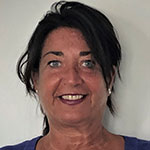 Virginia Navarro Mangado
Profesora de Prácticas profesionales
Professor of Professional Internships
Doctora en Comunicación Audiovisual y Publicidad por la Universidad Complutense de Madrid. Desde 1992 ha desarrollado su actividad profesional como Consultora de Comunicación, especialista en Procesos de Influencia para diversas instituciones entre los que destacan el Ministerio de Defensa (ISFAS), Instituto de Empresa, Ilustre Colegio de Abogados de Madrid, Visa Citibank España, American Express, Ayuntamiento de Cuenca, Cepsa, NH Hoteles, Unión Fenosa, Telefónica de España, Instituto Vasco de Administraciones Públicas, Grupo Popular, Santa Lucía Seguros, Laboratorios Wyeth, Morgan Stanley, Antena 3, Iberia, Grupo Cortefiel, Sage, DHL, Crédito y Caución, Junta de Extremadura.. Como docente ha diseñado e impartido programas formativos en grados y postgrados universitarios (Universidad Nebrija y UCM) y ciclos técnicos superiores (Cámara de Comercio de Madrid) Labor investigadora “La incidencia de las campañas electorales en la construcción de la imagen de los hospitales. Las crisis en los hospitales madrileños.” Tesis doctoral. (2015). UCM Directora de Comunicación, Marketing y Recursos Humanos en Security World Wide, S.L.: Diseño, organización y ejecución de las estrategias de comunicación de los espacios dedicados a organización de eventos y espacios de ventas temporales.
Virginia Navarro Mangado
Profesora de Prácticas profesionales
Professor of Professional Internships
Doctora en Comunicación Audiovisual y Publicidad por la Universidad Complutense de Madrid. Desde 1992 ha desarrollado su actividad profesional como Consultora de Comunicación, especialista en Procesos de Influencia para diversas instituciones entre los que destacan el Ministerio de Defensa (ISFAS), Instituto de Empresa, Ilustre Colegio de Abogados de Madrid, Visa Citibank España, American Express, Ayuntamiento de Cuenca, Cepsa, NH Hoteles, Unión Fenosa, Telefónica de España, Instituto Vasco de Administraciones Públicas, Grupo Popular, Santa Lucía Seguros, Laboratorios Wyeth, Morgan Stanley, Antena 3, Iberia, Grupo Cortefiel, Sage, DHL, Crédito y Caución, Junta de Extremadura.. Como docente ha diseñado e impartido programas formativos en grados y postgrados universitarios (Universidad Nebrija y UCM) y ciclos técnicos superiores (Cámara de Comercio de Madrid) Labor investigadora “La incidencia de las campañas electorales en la construcción de la imagen de los hospitales. Las crisis en los hospitales madrileños.” Tesis doctoral. (2015). UCM Directora de Comunicación, Marketing y Recursos Humanos en Security World Wide, S.L.: Diseño, organización y ejecución de las estrategias de comunicación de los espacios dedicados a organización de eventos y espacios de ventas temporales.
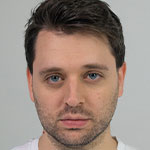 Eloy Noguera Atienza
Profesor de Maquillaje escénico y Caracterización
Professor of Stage Makeup and Characterization
Eloy Noguera Atienza, actor, maquillador y caracterizador. Máster de Maquillaje y Caracterización por la escuela Makeup Creative y especializado en Caracterización y FX por la escuela Harpo, ambas en Madrid. Como actor se graduó en Artes Escénicas en la Universidad Nebrija, complementando su educación en la universidad de Hunter College en Nueva York, además de un máster de Actuación Cinematográfica en la escuela TAI. Diseñador de maquillaje en espectáculos teatrales como "Sueños de Rupert" y "Una Noche en el Cocottes Cabaret" y maquillador en "Hairspray" o "Cuidado con las Macetas", este último en la Universidad Nebrija. En audiovisuales ha trabajado como maquillador y caracterizador en cortometrajes como "Yo No Fui", "Anémona" y "No Clickbait", o largometrajes como "Adaptasi" de Mit Borrás y Rachel Lamot, además de videoclips y publicidad. Como actor tiene más de 14 años de experiencia trabajando en teatro, microteatro, cabaret, cine, televisión y publicidad.
Eloy Noguera Atienza
Profesor de Maquillaje escénico y Caracterización
Professor of Stage Makeup and Characterization
Eloy Noguera Atienza, actor, maquillador y caracterizador. Máster de Maquillaje y Caracterización por la escuela Makeup Creative y especializado en Caracterización y FX por la escuela Harpo, ambas en Madrid. Como actor se graduó en Artes Escénicas en la Universidad Nebrija, complementando su educación en la universidad de Hunter College en Nueva York, además de un máster de Actuación Cinematográfica en la escuela TAI. Diseñador de maquillaje en espectáculos teatrales como "Sueños de Rupert" y "Una Noche en el Cocottes Cabaret" y maquillador en "Hairspray" o "Cuidado con las Macetas", este último en la Universidad Nebrija. En audiovisuales ha trabajado como maquillador y caracterizador en cortometrajes como "Yo No Fui", "Anémona" y "No Clickbait", o largometrajes como "Adaptasi" de Mit Borrás y Rachel Lamot, además de videoclips y publicidad. Como actor tiene más de 14 años de experiencia trabajando en teatro, microteatro, cabaret, cine, televisión y publicidad.
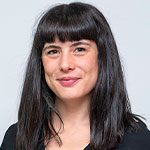 Lorena Palomino González
Profesora de Escenografía y dirección de arte
Professor of Scenography and art direction
Doctora. Licenciada en Bellas Artes por la Universidad Complutense de Madrid. Máster en formación del profesorado con especialidad en Artes Plásticas Se especializa como directora artística en 2015 trabajando con numerosas productoras audiovisuales en la producción de contenido audiovisual publicitario y de ficción. Trabaja como estilista de plató en la editorial Hearst Magazines e imparte talleres puntuales de Cómic en La Casa Encendida.
Lorena Palomino González
Profesora de Escenografía y dirección de arte
Professor of Scenography and art direction
Doctora. Licenciada en Bellas Artes por la Universidad Complutense de Madrid. Máster en formación del profesorado con especialidad en Artes Plásticas Se especializa como directora artística en 2015 trabajando con numerosas productoras audiovisuales en la producción de contenido audiovisual publicitario y de ficción. Trabaja como estilista de plató en la editorial Hearst Magazines e imparte talleres puntuales de Cómic en La Casa Encendida.
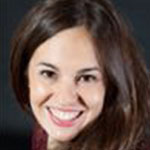 Luna Paredes Zurdo
Profesora de Teoría y herramientas interpretativas y Taller de Interpretación y Creación Escénica II
Professor of Theory and Interpretive Tools and Workshop on Interpretation and Scenic Creation II
Doctora en Estudios Teatrales por la UAH, licenciada en Filología Hispánica, diplomada en Interpretación por la Escuela de Teatro La Lavandería, y formó parte del último Entrenamiento Estable de La Abadía. Es profesora de interpretación, de análisis y comentario de textos y de corrección lingüística. Ha dirigido varios espectáculos del ciclo Los martes, milagro, en el Teatro Fernán Gómez. Sus últimos proyectos como actriz son: Impulsos (bpm) (Centro Dramático Nacional), Dos nuevos entremeses nunca representados (Teatro de La Abadía), Descarriadas (Teatro Al Punto), Flor(es) (La Espera Producciones) y Amor loco (Aire Teatro), entre otros. Ha impartido conferencias sobre teatro en centros de enseñanza, es colaboradora habitual de La aventura del saber, de La 2 de TVE, y ha coescrito varios libros de divulgación lingüística.
Luna Paredes Zurdo
Profesora de Teoría y herramientas interpretativas y Taller de Interpretación y Creación Escénica II
Professor of Theory and Interpretive Tools and Workshop on Interpretation and Scenic Creation II
Doctora en Estudios Teatrales por la UAH, licenciada en Filología Hispánica, diplomada en Interpretación por la Escuela de Teatro La Lavandería, y formó parte del último Entrenamiento Estable de La Abadía. Es profesora de interpretación, de análisis y comentario de textos y de corrección lingüística. Ha dirigido varios espectáculos del ciclo Los martes, milagro, en el Teatro Fernán Gómez. Sus últimos proyectos como actriz son: Impulsos (bpm) (Centro Dramático Nacional), Dos nuevos entremeses nunca representados (Teatro de La Abadía), Descarriadas (Teatro Al Punto), Flor(es) (La Espera Producciones) y Amor loco (Aire Teatro), entre otros. Ha impartido conferencias sobre teatro en centros de enseñanza, es colaboradora habitual de La aventura del saber, de La 2 de TVE, y ha coescrito varios libros de divulgación lingüística.
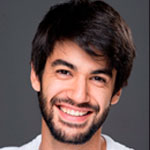 Álex Pastor Rodríguez
Profesor de Movimiento: acrobacia y lucha escénica
Professor of Movement: acrobatics and stage fighting
Licenciado en Interpretación Textual por la RESAD, con Máster en Interpretación para Cine y TV en Central de Cine. Formación específica en acrobacia de suelo y su metodología, acrobacia aérea y su metodología, especializado en trabajo en dúo y técnica de straps. Actor, cantante y acróbata con experiencia en teatro musical, textual y cabaret. Compagina su labor artística con la docente en el campo de la acrobacia aérea y la lucha escénica.
Álex Pastor Rodríguez
Profesor de Movimiento: acrobacia y lucha escénica
Professor of Movement: acrobatics and stage fighting
Licenciado en Interpretación Textual por la RESAD, con Máster en Interpretación para Cine y TV en Central de Cine. Formación específica en acrobacia de suelo y su metodología, acrobacia aérea y su metodología, especializado en trabajo en dúo y técnica de straps. Actor, cantante y acróbata con experiencia en teatro musical, textual y cabaret. Compagina su labor artística con la docente en el campo de la acrobacia aérea y la lucha escénica.
 Mª José Pedroche Montes (Pepa Pedroche)
Profesora de Teatro clásico / Técnica Vocal II: Verso
Professor of Classical Theater / Vocal Technique II: Verse
Licenciada en Arte Dramático y titulada en Producción por la R.E.S.A.D de Madrid. Colaboradora de seminarios y publicaciones de la Universidad Complutense, Castilla-La Mancha y U.N.E.D. Pepa Pedroche, debutó como actriz en el mundo de las series de televisión con Farmacia de guardia, Hermanas, y entre sus últimos trabajos figuran Corazón de, Amar en tiempos revueltos, Aquí no hay quien viva. Actriz de la Compañía Nacional de Teatro Clásico. En el mundo del cine hay que destacar sus trabajos en El laberinto del fauno de Guillermo del Toro; Castillos de cartón de Salvador García Ruiz; Bienvenido a casa de David Trueba; Los Borgia de Antonio Hernández; etc.
Mª José Pedroche Montes (Pepa Pedroche)
Profesora de Teatro clásico / Técnica Vocal II: Verso
Professor of Classical Theater / Vocal Technique II: Verse
Licenciada en Arte Dramático y titulada en Producción por la R.E.S.A.D de Madrid. Colaboradora de seminarios y publicaciones de la Universidad Complutense, Castilla-La Mancha y U.N.E.D. Pepa Pedroche, debutó como actriz en el mundo de las series de televisión con Farmacia de guardia, Hermanas, y entre sus últimos trabajos figuran Corazón de, Amar en tiempos revueltos, Aquí no hay quien viva. Actriz de la Compañía Nacional de Teatro Clásico. En el mundo del cine hay que destacar sus trabajos en El laberinto del fauno de Guillermo del Toro; Castillos de cartón de Salvador García Ruiz; Bienvenido a casa de David Trueba; Los Borgia de Antonio Hernández; etc.
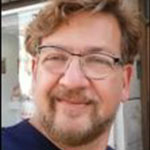 Leyson Orlando Ponce Flores
Profesor de Historia del teatro y Educación Corporal III
Professor of Theatre History and Physical Education III
Leyson Ponce es Venezolano/español. Doctor en Filosofía de la Danza (Universidad de Salamanca y Valladolid, 2018), con Mención SOBRESALIENTE CUM LAUDE, acreditado por ANECA en 2020. Posee una larga trayectoria en la investigación coreográfica, la gestión académica y en procesos de enseñanza y aprendizaje en las artes. Ha impartido clases en la Universidad de las Artes de Venezuela, la Universidad Nacional de Costa Rica, Universidad Nacional Autónoma de México, Universidad Central de Ecuador, Instituto Superior de las Artes en La Habana, Cuba y The Opera Atelier en Miami USA entre otras. Formado en Venezuela y en Alemania en Estudios de Composición Coreográfica (Aufbaustudium) de la Folkwang University of Arts en Essen. Es coreógrafo e intérprete invitado desde 2015 de Provisional Danza en Madrid que dirige Carmen Werner (Premio Nacional de Danza de España 2007).
Leyson Orlando Ponce Flores
Profesor de Historia del teatro y Educación Corporal III
Professor of Theatre History and Physical Education III
Leyson Ponce es Venezolano/español. Doctor en Filosofía de la Danza (Universidad de Salamanca y Valladolid, 2018), con Mención SOBRESALIENTE CUM LAUDE, acreditado por ANECA en 2020. Posee una larga trayectoria en la investigación coreográfica, la gestión académica y en procesos de enseñanza y aprendizaje en las artes. Ha impartido clases en la Universidad de las Artes de Venezuela, la Universidad Nacional de Costa Rica, Universidad Nacional Autónoma de México, Universidad Central de Ecuador, Instituto Superior de las Artes en La Habana, Cuba y The Opera Atelier en Miami USA entre otras. Formado en Venezuela y en Alemania en Estudios de Composición Coreográfica (Aufbaustudium) de la Folkwang University of Arts en Essen. Es coreógrafo e intérprete invitado desde 2015 de Provisional Danza en Madrid que dirige Carmen Werner (Premio Nacional de Danza de España 2007).
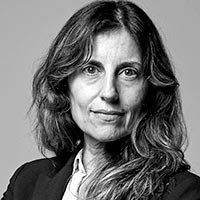 Alejandra Prieto García
Profesora de Técnicas, estilos y géneros de interpretación II
Professor of Techniques, Styles and Genres of Interpretation II
Es creadora escénica y Doctora con Mención Internacional por la URJC en Humanidades: Lenguaje y Cultura. Como investigadora recibió la beca predoctoral de la fundación Japón 2022. Ha sido becaria de la fundación Fulbright, residiendo en Nueva York donde cursa un MFA en Sarah Lawrence College de dirección de teatro. Ha trabajado en teatro, cine y televisión desde hace más de 20 años. Actualmente combina la práctica artística con la docencia y su carrera se ha desarrollado en distintas universidades, en la URJC, en la universidad de Jaén y la universidad Olavide en Sevilla, entre otras.
Alejandra Prieto García
Profesora de Técnicas, estilos y géneros de interpretación II
Professor of Techniques, Styles and Genres of Interpretation II
Es creadora escénica y Doctora con Mención Internacional por la URJC en Humanidades: Lenguaje y Cultura. Como investigadora recibió la beca predoctoral de la fundación Japón 2022. Ha sido becaria de la fundación Fulbright, residiendo en Nueva York donde cursa un MFA en Sarah Lawrence College de dirección de teatro. Ha trabajado en teatro, cine y televisión desde hace más de 20 años. Actualmente combina la práctica artística con la docencia y su carrera se ha desarrollado en distintas universidades, en la URJC, en la universidad de Jaén y la universidad Olavide en Sevilla, entre otras.
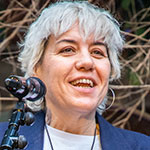 Mª del Mar Ramos Rodríguez
Coordinadora de prácticas de la FCA
FCA Internship Coordinator
Doctora en Bellas Artes por la Universidad Complutense de Madrid. Licenciada en Ciencias de la Imagen y Sonido por la misma universidad. Su práctica profesional se ha desarrollado en el mundo de la fotografía, la producción audiovisual y el diseño gráfico y editorial. Destaca su experiencia laboral en el mundo de la publicidad cinematográfica, en estudios de diseño y en la productora cinematográfica CineCompany, así como en las empresas de comunicación editorial Grupo Zeta y Vocento. En la Universidad de Nebrija imparte docencia desde 1998 en programas de grado y postgrado en las áreas de Comunicación Audiovisual, Periodismo y Publicidad al tiempo que lo compagina con proyectos gráficos y audiovisuales para empresas e instituciones. Desde el año 2022 es la coordinadora académica de Prácticas de la Facultad de Comunicación y Artes.
Mª del Mar Ramos Rodríguez
Coordinadora de prácticas de la FCA
FCA Internship Coordinator
Doctora en Bellas Artes por la Universidad Complutense de Madrid. Licenciada en Ciencias de la Imagen y Sonido por la misma universidad. Su práctica profesional se ha desarrollado en el mundo de la fotografía, la producción audiovisual y el diseño gráfico y editorial. Destaca su experiencia laboral en el mundo de la publicidad cinematográfica, en estudios de diseño y en la productora cinematográfica CineCompany, así como en las empresas de comunicación editorial Grupo Zeta y Vocento. En la Universidad de Nebrija imparte docencia desde 1998 en programas de grado y postgrado en las áreas de Comunicación Audiovisual, Periodismo y Publicidad al tiempo que lo compagina con proyectos gráficos y audiovisuales para empresas e instituciones. Desde el año 2022 es la coordinadora académica de Prácticas de la Facultad de Comunicación y Artes.
 Isabel Sánchez Barrena
Profesora de Movimiento
Professor of Motion
Licenciada en Arte Dramático por la Universidad de Kent (Canterbury), cursa estudios de teatro gestual en la RESAD. Formada desde 2009 con SITI Company y Anne Bogart, miembro del primer elenco SITI Conservatory (SITI Company) en Nueva York, USA. Estudia con Tadashi Suzuki en Toga Mura Japón el Método Suzuki de entrenamiento actoral, y, desde 2017, con Marie Overlie, con quien se forma como artista y pedagoga en su teoría y práctica de la Post-Modernidad de teatro/danza "Los Seis Viewpoints". Ejerce como actriz desde 2005 y alterna su carrera entre NYC y España desde 2009, tanto como solista como miembro de diferentes compañías. Es premio Ceres de Teatro 2012, y finalista a otros varios premios nacionales.
Isabel Sánchez Barrena
Profesora de Movimiento
Professor of Motion
Licenciada en Arte Dramático por la Universidad de Kent (Canterbury), cursa estudios de teatro gestual en la RESAD. Formada desde 2009 con SITI Company y Anne Bogart, miembro del primer elenco SITI Conservatory (SITI Company) en Nueva York, USA. Estudia con Tadashi Suzuki en Toga Mura Japón el Método Suzuki de entrenamiento actoral, y, desde 2017, con Marie Overlie, con quien se forma como artista y pedagoga en su teoría y práctica de la Post-Modernidad de teatro/danza "Los Seis Viewpoints". Ejerce como actriz desde 2005 y alterna su carrera entre NYC y España desde 2009, tanto como solista como miembro de diferentes compañías. Es premio Ceres de Teatro 2012, y finalista a otros varios premios nacionales.
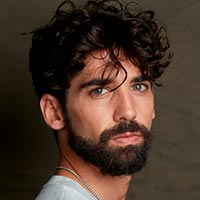 Jorge Rodríguez Pérez (Jorge Yumar)
Profesor de Taller de Interpretación y Creación Escénica II / Proyectos de interpretación y creación escénica
Professor of Interpretation Projects and Stage Creation / Workshop on Interpretation and Scenic Creation II
Es un actor formado en la Universidad Antonio de Nebrija, con trayectoria en teatro y audiovisual. Ha participado en producciones como “Fortunata y Benito” (Teatros del Canal, dir. Laila Ripoll), “La Edad de la Ira” y “La Isla del Tesoro” (La Joven, dir. José Luis Arellano), “Amén” (Carlos Be), “Electra” y “Don Juan Tenorio” (dir. Ferrán Madico), “Un día habrá una isla” (dir. Cuco Afonso) y “Mañanas de abril y mayo” (Micomicón, dir. Laila Ripoll). En televisión ha trabajado en “Las noches de Tefía” (Atresplayer) y en “Sánchez y Carbonell” (TVE) con la pieza Oferta.
Jorge Rodríguez Pérez (Jorge Yumar)
Profesor de Taller de Interpretación y Creación Escénica II / Proyectos de interpretación y creación escénica
Professor of Interpretation Projects and Stage Creation / Workshop on Interpretation and Scenic Creation II
Es un actor formado en la Universidad Antonio de Nebrija, con trayectoria en teatro y audiovisual. Ha participado en producciones como “Fortunata y Benito” (Teatros del Canal, dir. Laila Ripoll), “La Edad de la Ira” y “La Isla del Tesoro” (La Joven, dir. José Luis Arellano), “Amén” (Carlos Be), “Electra” y “Don Juan Tenorio” (dir. Ferrán Madico), “Un día habrá una isla” (dir. Cuco Afonso) y “Mañanas de abril y mayo” (Micomicón, dir. Laila Ripoll). En televisión ha trabajado en “Las noches de Tefía” (Atresplayer) y en “Sánchez y Carbonell” (TVE) con la pieza Oferta.
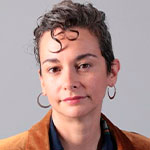 Claudia Rodríguez-Ponga Linares
Profesora de Desarrollo de competencias profesionales III
Professor of Professional Skills Development III
Doctora en Artes por la Universidad de São Paulo. Máster en Comisariado por el Goldsmiths College de Londres y licenciada en Bellas Artes por la Universidad Complutense de Madrid. Actualmente es profesora asociada o colaboradora en IE University y SUR Escuela (UC3M), Universidad Autónoma de Madrid (UAM) y en la Universitat Oberta de Catalunya (UOC). Su práctica curatorial incluye exposiciones individuales con Sara Ramo (Sala Alcalá 31), Debora Bolsoni (Athena Contemporanea, Drawing Lab Paris), así como exposiciones colectivas como “NudoNido” junto a la comisaria brasileña Isabella Lenzi, premiada por un jurado de expertos para la Sala de Arte Joven de la Comunidad de Madrid. Actualmente trabaja en un proyecto individual con la artista Eva Lootz que tendrá lugar en 2024 en la Sala Alcalá 31. Entre sus publicaciones más recientes destacan “Algo piensa”, un ensayo publicado en la Revista Concreta; "El tarot de Eva", publicado en la Revista Accesos (UCM); "Sobre el arte como trabajo afectivo-reproductivo", publicado en la Revista Arte ConTexto; "¿Creen ustedes en lo que existe?", publicado en la Revista Re-visiones (UCM); o "Crítica en estado de rêverie", publicada en la Revista de Occidente. Ha publicado textos en catálogos de artistas como Rita Castro Neves & Daniel Moreira, Sonia Navarro Peralta, Sara Ramo o Paulo Nimer Pjotta. Es autora del libro Tentempié, una recopilación de ensayos sobre pintores y pintura.
Claudia Rodríguez-Ponga Linares
Profesora de Desarrollo de competencias profesionales III
Professor of Professional Skills Development III
Doctora en Artes por la Universidad de São Paulo. Máster en Comisariado por el Goldsmiths College de Londres y licenciada en Bellas Artes por la Universidad Complutense de Madrid. Actualmente es profesora asociada o colaboradora en IE University y SUR Escuela (UC3M), Universidad Autónoma de Madrid (UAM) y en la Universitat Oberta de Catalunya (UOC). Su práctica curatorial incluye exposiciones individuales con Sara Ramo (Sala Alcalá 31), Debora Bolsoni (Athena Contemporanea, Drawing Lab Paris), así como exposiciones colectivas como “NudoNido” junto a la comisaria brasileña Isabella Lenzi, premiada por un jurado de expertos para la Sala de Arte Joven de la Comunidad de Madrid. Actualmente trabaja en un proyecto individual con la artista Eva Lootz que tendrá lugar en 2024 en la Sala Alcalá 31. Entre sus publicaciones más recientes destacan “Algo piensa”, un ensayo publicado en la Revista Concreta; "El tarot de Eva", publicado en la Revista Accesos (UCM); "Sobre el arte como trabajo afectivo-reproductivo", publicado en la Revista Arte ConTexto; "¿Creen ustedes en lo que existe?", publicado en la Revista Re-visiones (UCM); o "Crítica en estado de rêverie", publicada en la Revista de Occidente. Ha publicado textos en catálogos de artistas como Rita Castro Neves & Daniel Moreira, Sonia Navarro Peralta, Sara Ramo o Paulo Nimer Pjotta. Es autora del libro Tentempié, una recopilación de ensayos sobre pintores y pintura.
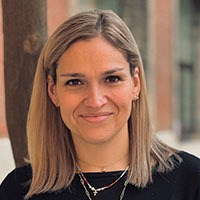 Marta Saavedra Llamas
Profesora de Trabajo de fin de Grado
Professor of the Final Degree Project
Doctora en Ciencias de la Información por la Universidad Complutense de Madrid. Profesora acreditada por ANECA. Realizó en la misma universidad el postgrado “Comunicación bursátil y sectores financieros” y la Licenciatura en Periodismo. En el área profesional ha trabajado como redactora en los periódicos regionales El faro de Murcia y El diario de Murcia y en los económicos El nuevo Lunes, Dirigentes y Nuestros Negocios. De 2008 a 2010 fue redactora jefe de estas dos últimas publicaciones y del confidencial Dirigentesdigital.com. Cuenta con experiencia en el ámbito de la comunicación institucional, habiendo formado parte del equipo de la Agencia de Calidad, Acreditación y Prospectiva de las Universidades de Madrid (ACAP), donde trabajó anteriormente en el área de acreditación del profesorado. Actualmente, es directora de la revista NUESTRA (Universidad Nebrija).
Marta Saavedra Llamas
Profesora de Trabajo de fin de Grado
Professor of the Final Degree Project
Doctora en Ciencias de la Información por la Universidad Complutense de Madrid. Profesora acreditada por ANECA. Realizó en la misma universidad el postgrado “Comunicación bursátil y sectores financieros” y la Licenciatura en Periodismo. En el área profesional ha trabajado como redactora en los periódicos regionales El faro de Murcia y El diario de Murcia y en los económicos El nuevo Lunes, Dirigentes y Nuestros Negocios. De 2008 a 2010 fue redactora jefe de estas dos últimas publicaciones y del confidencial Dirigentesdigital.com. Cuenta con experiencia en el ámbito de la comunicación institucional, habiendo formado parte del equipo de la Agencia de Calidad, Acreditación y Prospectiva de las Universidades de Madrid (ACAP), donde trabajó anteriormente en el área de acreditación del profesorado. Actualmente, es directora de la revista NUESTRA (Universidad Nebrija).
 Celia Sancho Belinchón
Profesora de Herramientas digitales
Professor of Digital Tools
Doctora en Comunicación. Acreditada por ANECA. Responsable de Comunicación Digital de Ciudadanos en la Asamblea de Madrid. Gestión de equipo, redes sociales y estrategia de comunicación online. (enero 2020-junio 2021) - Responsable RRSS GP Ciudadanos en Congreso de los Diputados. Desde abril 2017 hasta diciembre 2019. - Ponente en el I Congreso Nacional de Jóvenes Investigadores de la Comunicación (9 mayo 2016) - Publicación de un capítulo de libro “Claves de la comunicación para niños y adolescentes” (2015) - Impartición de clases en el Master de Comunicación social en la Facultad de Ciencias de la Información.
Celia Sancho Belinchón
Profesora de Herramientas digitales
Professor of Digital Tools
Doctora en Comunicación. Acreditada por ANECA. Responsable de Comunicación Digital de Ciudadanos en la Asamblea de Madrid. Gestión de equipo, redes sociales y estrategia de comunicación online. (enero 2020-junio 2021) - Responsable RRSS GP Ciudadanos en Congreso de los Diputados. Desde abril 2017 hasta diciembre 2019. - Ponente en el I Congreso Nacional de Jóvenes Investigadores de la Comunicación (9 mayo 2016) - Publicación de un capítulo de libro “Claves de la comunicación para niños y adolescentes” (2015) - Impartición de clases en el Master de Comunicación social en la Facultad de Ciencias de la Información.
More Academic Information
Official Degree:Bachelor's Degree in Performing Arts
Young people with an artistic vocation interested in Art, Literature, the performing world, as well as in all the processes of Scenic Creation in the field of theater, cinema and television. The Bachelor's Degree in Performing Arts is a rigorous and professional training for all young people who want to train as actors, writers, playwrights, stage directors, producers and directors in a multidisciplinary and enriching university environment provided by the intense contact with students in other degrees.
The Performing Arts graduate will be a professional with diverse knowledge of the theatrical world, including interpretation, dramaturgy, voice, movement, set design and direction.
240 ECTS credits.
Minimum 12 ECTS and maximum 90 ECTS per registration and academic period
Center responsible:School of Communication and Arts
Branch of knowledge: Arts and Humanities
Available places: 45
Type of Education: Classroom attendance
Competences
Basic Competences- BC1- Students have demonstrated they possess and understand knowledge in an area of study, which starts from the base of general secondary education, and is usually at a level that, although supported by advanced textbooks, also includes some aspects that involve knowledge from the vanguard of their field of study.
- BC2- Students know how to apply their knowledge to their work or vocation in a professional way and possess the competences that are usually demonstrated through the explanation and defense of arguments and problem solving within their area of study.
- BC3- Students have the ability to gather and interpret relevant data (usually within their study area) to make judgments that include reflection on relevant social, scientific and ethical issues.
- BC4- Students can transmit information, ideas, problems and solutions to both specialized and non-specialized audiences.
- BC5- Students have developed the learning skills necessary to undertake further studies with a high degree of autonomy.
- GC1- Demonstrate the correct use of oral and written language in the English language.
- GC2- Demonstrate the correct use of oral and written language in the Spanish language in the field of interpretation.
- GC3- Apply theoretical knowledge to understanding reality and solving specific problems in the area of knowledge of Arts and Humanities, especially in the theatrical and audiovisual field.
- GC4- Compile, distinguish and categorize information from bibliographic and documentary sources in the field of performing arts.
- GC5- Apply critical reasoning by using analysis and synthesis of the theatrical environment.
- GC6- Use ingenuity and develop creativity, especially in theatrical and/or audiovisual projects.
- GC7- Acquire criteria for the application of the competences developed during the education program in the theatrical field.
- GC8- Apply the knowledge acquired in the education program in a practical way while carrying out their professional activity.
- GC9- Acquire an ethical commitment with their work, know the legal system, especially applied to professional practice related to artistic intellectual property.
- GC10- Demonstrate social sensitivity in carrying out their professional and/or academic work, respecting the regulations in force both at the Spanish and European level, the codes of good practices, self-control criteria, gender equality, special needs of disabled people, protection of children and, in general, the principles contained in the Spanish Constitution and the values of the Culture of Peace.
- GC11- Demonstrate the ability to work in a team, developing interpersonal relationships, while carrying out of theatrical and/or audiovisual projects
- GC12- Demonstrate the ability to effectively lead and manage projects, assuming the principles of social and cultural responsibility.
- GC13- Correctly handle new communication technologies.
- SC1- Use the different interpretive techniques to analyze, create the character and integrate it into the show.
- SC2- Master concentration and sensory memory, as well as reflexes through specific body techniques.
- SC3- Master improvisation as a technique for the creation of the character.
- SC4- Apply the techniques that allow to them to expand their timbre possibilities and use a correct projection of their voice.
- SC5- Know the psychophysical communication of dramatic conflict.
- SC6- Master the concepts of rhythm, movement, harmony, balance, space and time that are essential in theatrical expression.
- SC7- Apply imagination and intuition to creating the character.
- SC8- Master self-control techniques through relaxation.
- SC9- Know and relate the social, aesthetic and literary factors that support the history of the theatrical event.
- SC10- Know the different modes of interpretation.
- SC11- Know the techniques integrated in the theatrical event such as makeup, lighting, and clothing, etc.
- SC13- Know in depth the different schools and performing techniques.
- SC14- Know and interpret the different artistic styles with aesthetic sensitivity.
- SC15- Know the techniques involved in the theatrical phenomenon: lighting, scenography, costumes, characterization, etc.
- SC16- Use interpretation techniques in directing actors.
- SC17- Master the dramaturgy of the theatrical proposal.
- SC18- Integrate both specific and general acquired competences in the creation of an individual and original project, and in its presentation and defense before a university tribunal.
- SC19- Know about the production of theatrical shows.
- SC20- Demonstrate the ability to correctly express ideas and arguments both in writing and orally, adequately managing the techniques of expression, presentation, defense and argumentation, and mastering the principles of rhetoric and oratory.
- SC21- Acquire knowledge about the history and evolution of cinema through its aesthetic and industrial proposals, as well as its social and cultural relevance.
- SC24- Ability to promote the student's autonomous learning, based on the didactic knowledge provided, symbolic play and role-playing, and its subsequent application in educational settings.
Admission
Admission profile
Those interested in studying and obtaining a Bachelor's Degree in Performing Arts from the Antonio de Nebrija University must have a baccalaureate degree, having preferably studied the baccalaureate specialized in Performing Arts, also with the orientation of using new digital and audiovisual technologies.
The access routes to the Bachelor’s Degree in Performing Arts are described below. In addition, Nebrija University will publish on its website the places available for the first year of the Bachelor's Degree in Performing Arts.
1. Students who have a baccalaureate degree and have passed the University Access Tests may apply for admission, in accordance with the provisions of Royal Decree 1892/2008, of November 14, which regulates the access conditions to official university teachings of Bachelor's Degrees.
2. Also, and in accordance with the provisions of RD 412/2014, the following students may apply for admission to the university:
a) Graduates in European Baccalaureate or International Baccalaureate.
b) Students who have degrees, diplomas or Baccalaureate studies from educational systems of Member States of the European Union, or other States with which international agreements applicable in this regard have been signed, on a reciprocal basis.
c) Students who have degrees, diplomas or studies homologated to the Baccalaureate degree of the Spanish Educational System, obtained or carried out in educational systems of States that are not members of the European Union with which no international agreements have been signed in reciprocity for the recognition of the Baccalaureate degree, notwithstanding the provisions of article 4 of RD 412/2014.
d) Students who have official degree of Senior Technician in Vocational Formation, of Senior Technician in Plastic Arts and Design, or of Senior Sports Technician belonging to the Spanish Educational System, or degrees, diplomas or studies declared equivalent or homologated to said degrees, without prejudice of the provisions in article 4 of RD 412/2014.
e) Students who have degrees, diplomas or studies, other than those equivalent to Baccalaureate degrees, Senior Technician in Vocational Training, Senior Technician in Plastic Arts and Design, or Senior Sports Technician of the Spanish Educational System, obtained or carried out in a member State of the European Union, or in other States with which international agreements have been signed that are applicable in this regard, on a reciprocal basis, when said students meet the academic requirements demanded in said Member State to access its Universities.
f) People who have passed the university entrance exam for people over 25 years old.
g) People who have passed the access test for official Bachelor's degree studies for people over 40 years old, through accreditation of work or professional experience. The procedures for admission through this route are reflected in the “POA_9 Access procedure over people over 40 years old”
h) People who have passed the university entrance exam for people over 45 years old.
i) Students who have an official Bachelor's, Master's or equivalent degree.
j) Students who have an official Associate's Degree, or a degree as Technical Architect, Technical Engineer, Undergraduate, Architect, Engineer, corresponding to the previous ordinance of university education, or an equivalent degree.
k) Students who have taken partial foreign or Spanish university studies, or who have finished foreign university studies but have not obtained their homologation in Spain and wish to continue studies at a Spanish university. In this case, it will be an indispensable requirement that Nebrija University have recognized at least 30 ECTS credits.
l) Students who were able to access the university according to regulations of the Spanish Educational System prior to Organic Law 8/2013, of December 9.
m) According to Order ECD/1941/2016, of December 22, in its sole transitory provision, it is not necessary to pass the Baccalaureate assessment test in order access the University in the following cases:
• Students who join a baccalaureate course in the educational system defined by Organic Law 8/2013, of December 9, with Baccalaureate subjects that were not passed from the curriculum prior to its implementation, and who study these subjects according to the curriculum of the prior educational system.
• Students who obtained the baccalaureate degree in the 2015-2016 academic year and did not access the University at the end of said year.
In both cases, and when these students do not take the test, the grade to access official undergraduate university studies will be the final grade obtained in Baccalaureate.
3. A non-Spanish speaking candidate must present a certification that certifies knowledge of the Spanish language at a B2 level of the CEFR. The level accreditation will be validated through the official degrees admitted by the table of certificates accepted by ACLES and/or Instituto Cervantes. Valid for one year.
4. In the degree curriculum there are four subjects in which students can choose to be taught in Spanish or English.
In the case of students with special educational needs derived from disabilities, the need for possible curricular adaptations, itineraries or alternative studies will be assessed.
At the Antonio de Nebrija University, the admission procedures established by university legislation will be carried out with particular reference to the guiding principles of accessing Spanish universities: equality, merit, ability, universal accessibility and adjustment to the criteria of the European Higher Education Area.
How to and deadlines for submitting admission applications
In order to apply for admission to any official university Bachelor's degree, it will be necessary to complete the corresponding admission application through the University website, or request it at any of the university campuses within the deadlines established by the Department of University Development.
Documentation necessary for admission to Bachelor's degree studies
a) Students with University Entrance Exams (from Baccalaureate and university entrance exams for people over 25yo): Those who have attended the University Entrance Exams must bring:
- Copy of DNI or accrediting document.
- Report card with the grades of the University Entrance Exams.
- Personal academic record with the grades obtained in baccalaureate.
- File Transfer Fees sealed by the University Secretary where the University Entrance Exam (Selectividad) was taken.
b) Students who have a degree, diploma or studies equivalent to the Baccalaureate degree in educational systems from Member States of the European Union or from other States with which applicable international agreements have been signed, on a reciprocal basis. Graduates of European Baccalaureate or International Baccalaureate.
- Copy of Passport or accrediting document.
- Credentials for compliance with the requirements issued by the UNED or by the specified entity.
- Report card with grades obtained in the University Entrance Exams, if applicable.
- Accreditation of a B2 level in the Spanish language in the case of students whose nationality does not correspond to Spanish-speaking countries.
c) Students from Advanced Vocational Training, Second Degree Vocational Training: These students must provide the following:
- Copy of the DNI or accrediting document.
- Personal academic record with the grades obtained and the final numerical grade.
- Diploma or the receipt of having paid the issuing fee of the diploma.
- In their case, document stating the result of the Specific Phase of the University Entrance Exams.
d) University Graduates:
- Copy of the DNI or accrediting document.
- Academic record with the grades of each of the subjects taken and the final grade average.
- Diploma or receipt of having paid the issuing fee for the diploma.
In the case of students with validated foreign degrees, they must provide the following documentation:
- Copy of Passport, DNI or accrediting document.
- Homologation of the university degree.
- Equivalences of grade averages of studies taken in foreign centers.
- Accreditation of a B2 level in the Spanish language in the case of students whose nationality does not correspond to Spanish-speaking countries.
e) Students from previous educational arrangements who have not attended the general phase of University Entrance Exams, regulated in Royal Decree 1892/2008, of November 14:
- Students from COU (college preparation courses) prior to the 1974-75 academic year, and students who have passed the Higher Baccalaureate with a state exam: copy of DNI, grade book and the grade card of the specific phase of the University Entrance Exams, if applicable.
- Students who have passed the Higher Baccalaureate, PREU and the Maturity Test: copy of DNI, grade book, Maturity Test card and the grade card of the specific phase of the University Entrance Tests, in their case.
f) Students with partial recognition of foreign studies:
These students must submit the following documentation, officially translated and legalized, if applicable:
- Recognition request form.
- Copy of Passport or accrediting document.
- Academic record accrediting the level and type of studies carried out, issued by the corresponding official Center, stating, at least, the following data: subjects taken, the credits or hourly load of each, grade and table or scale of grades.
- Curriculum or table of subjects of the degree to which the subjects to be recognized belong, with express indication of the duration of those studies in academic years and the subjects that comprise it, and with the original seal of the Center of origin, or failing that, the documentation requested in the credit recognition procedure.
- Subject programs, with details of the content and scope (hours and credits) with which they have been taken, and with the original stamp of the Center of origin or, failing that, the documentation requested in the credit recognition procedure.
- Accreditation of a B2 level in the Spanish language in the case of students whose nationality does not correspond to a Spanish-speaking country.
- Equivalences of average grades of studies carried out in foreign centers.
i) Students requesting admission due to change of university and/or studies. Students from other universities must submit the following documentation:
- Copy of the DNI or accrediting document
- Copies sealed by the university of origin of the official content and competence programs, or teaching guides, of the different subjects passed or, failing that, the documentation requested in the credit recognition procedure
- Personal academic record of university studies started with an average grade of 0-10, based on the provisions of Royal Decree 1125/2003 (BOE 09/18/2003).
- Photocopy of the BOE where the degree's curriculum you are studying is published.
j) Access to the University for people over 45 yo.
- Copy of the DNI or accrediting document
- Certificate accrediting the passing of the Entrance Exam for those over 45 years old (test carried out at Nebrija University)
k) Access to the University for people over 40 yo.
- Copy of the DNI or accrediting document
- Positive report after the assessment at Nebrija University of all the requirements established in Art. 16 RD 412/2014.
Only those candidates who have submitted the required documentation within the deadlines established by the Admissions Department will be processed. In addition, the student will be asked for all the additional information that was deemed appropriate in order to know the candidate's suitability for the Bachelor's Degree.
For the purposes of pre-admission and admission, the evaluation of the candidate will be made using 0 to 10 points, taking into account the following criteria and percentages:
Academic record of the student's route of origin: 60%
Multiple-choice psychotechnical test: Evaluation 5%
This test consists of a personality assessment test that explores the emotional, intellectual, social, and norms and values areas of each candidate for a Bachelor's Degree in Performing Arts at Nebrija University.
English level test: Evaluation: 5%
In addition to the competences established in the Bachelor's Degree in Audiovisual Communication, we have included another related to the adequate knowledge of the English language, both oral and written. The English level tests consist of a written exam with multiple choice questions, oral and written comprehension. They are taken in person or online, and are held in computer rooms on each campus, with professors from the Institute of Modern Languages. Depending on the results of this test, the student will be positioned at the corresponding level.
It will not be necessary for the candidate to take the language positioning test if they provide a document proving their English level. The level accreditation will be validated through the official degrees established by the table of certificates accepted by ACLES. They are valid for one year. Students who take degrees in which subjects are taught in English must have accredited a B2 level in that language.
Specific test of knowledge about the Bachelor's Degree in Performing Arts. Evaluation 10%
It contains multiple-choice questions and consists mainly of specific contents of some of the main areas of general cultural and artistic knowledge that will be studied in the degree chosen by the candidate, in addition to other elements common to all degrees.
Personal interview. Evaluation 20%
As a strategy to know the characteristics of the applicants, the academic department will try to determine if the candidate has sufficient motivation, training and knowledge, abilities, aptitudes, communication skills, extracurricular activities and future interests necessary to be admitted as a student of the Bachelor's Degree in Performing Arts at Nebrija University.
The Admissions Committee will meet as needed and communicate the result of the admission to the candidate by email, telephone and letter so that he/she can proceed to enroll.
Once the student has been admitted, they will proceed to enroll, which consists of the following phases:
Reserve their place
Candidates must reserve their place. This economic pre-enrollment guarantees the candidate's place at the University. These will not be returned except for students who are admitted conditionally, or do not possess the legal requirements for access, or for a justified medical cause.
Pre-enrolled candidates who wish to formalize their academic enrollment at the University must, within the indicated deadlines, follow these steps:
1.- Submit documentation: certify that he/she meets the requirements established by Spanish university legislation in order to start university studies.
2.- Formalization of the enrollment process online: The self-enrollment service on the Nebrija website allows admitted students to carry out all academic, financial and administrative procedures, within the established deadlines. For this, they will receive, along with their admission letter, the access code and personal password necessary to be able to carry out their self-enrollment. Once that is formalized, the candidate acquires the status of student of Nebrija University.
Conditional enrollment in Bachelor's degree studies
Students with non-university foreign studies pending homologation may be admitted to the University subject to compliance with the requirements established by current regulations. Once the homologation procedure has been resolved, the student must submit the documentation that accredits it. If they do not do so, their admission and enrollment, as well as the exams taken, where appropriate, will not be valid.
Maximum and minimum number of enrollment credits in Bachelor's degree studies.
Students will be able to enroll:
In Bachelor's degree studies from 45 ECTS credits to a maximum of 90 ECTS credits per academic year, in the case of full-time study, and from a minimum 12 ECTS credits to less than 45 ECTS credits for those who study part-time.
These criteria are applicable to any of the modalities taught at the Antonio de Nebrija University (class attendance, blended and distance learning).
The Directorate of the Academic Department may authorize enrollment in a different number of credits for exceptional reasons.
Enrollment Modification
Enrollment modification is understood to be any change that occurs in a student's enrollment.
If the student, being enrolled in a certain degree, subject, elective or program decides to change his/her enrollment, he/she must request it by writing to the Registrar's Office for authorization. Said requests must be approved by the Academic Department. A maximum period of 15 days is established after the effective beginning of the academic year and/or the second semester to request these changes. After this deadline, the student will not be able to make changes to his/her enrollment.
Students who wish to change the modality in which they are studying a degree, from the class attendance modality to distance modality or vice versa, must request it in writing to the Registrar's Office, which will authorize it or not, after taking the Department's report into account.
Los estudiantes que deseen cambiar la modalidad en la que cursan una titulación, desde la modalidad presencial a la modalidad a distancia o viceversa, deberán solicitarlo por escrito a Secretaría de Cursos que lo autorizará o no contando previamente con el informe del Departamento.
If the number of applicants exceeds the number of places offered the student's academic record will be taken as an admission criterion (grade average).
Employability
Career Opportunities
The Bachelor's Degree in Performing Arts has a collaboration agreement with some of the best companies and institutions in the sector, such as Smedia, Atresmedia and Mediaset España, where students can carry out their professional internships and obtain a first work experience of with maximum rigorousness.
We train you for a full career, one that is highly vocational and that will mark your life. The profile that the Bachelor's Degree in Performing Arts, with its two specializations, intends to create is that of a professional with a broad multidisciplinary, technical and creative projection and that is prepared to develop his/her creativity and initiative in the following fields:
Internships
Companies in agreement with the Nebrija University regarding internships Procedure of action in the realization of External Internships Management process for external internships and Professional Guidance Labor insertion survey report More Information on Internships in CompaniesEmployability recognized in the Rankings
The commitment of Nebrija University to the academic requirement, training in leading companies and institutions, innovation in multidisciplinary programs and international projection, places the University in the top positions of the most important rankings.
The International Ranking QS Stars awards Nebrija University the maximum score in the quality and satisfaction of students in teaching, employability of the graduates and the internationalization of the institution.
The national rankings also recognize Nebrija University as the first Spanish university in teaching and second in employability, highlighting its performance in research, knowledge transfer and internationalization.
The Bologna Declaration formalized the principles on which the European Higher Education Area should be based: quality, mobility, diversity, competitiveness and employment growth.
From this, Nebrija stands as an academic model of reference, educating students with excellent individual behavior, interaction with their environment and motivated by and for constant and continuous training. The Nebrija Institute of Professional Skills works every day to achieve the differentiation of our students through the development of attitudes and skills.
The main objective is for students to achieve the best of themselves through the development and empowerment of their personal skills and resources through personal self-knowledge.
In addition, some of the professional skills that are worked on within the three seminars are those related to interpersonal skills and active communication skills and negotiation, indispensable for our students to know how to transmit ideas, to argue them, to provide information and opinions in an adequate, clear and convincing way.
Within what will be their work performance, other aspects such as teamwork, conflict resolution and project management ability will be worked on.
In the third block, skills worked on are those aimed at increasing the student's employability. They will work with tools and techniques for job searching, and perform tasks that achieve in the student a greater use of their personal skills.
For all this we have currently active experts in selection of people, professionals dedicated to personal and professional training and professionals dedicated to the world of communication and the arts.
In this way, and in a complementary way to his/her specific training, we help the student create a differentiating pattern in the social and business environment in which he/she will be immersed when he/she finishes his/her studies.
International
The Department of International Programs of Nebrija University carries out a constant effort to follow up on the agreements with the most prestigious universities.
Students can study at one of the following foreign universities:
NOTE: : The host universities offered by degree may vary according to the International Mobility Program. For more up-to-date information, students can consult the online information in the International Mobility Program.
Several universities have special academic or linguistic requirements. For more information, consult the Department of International Programs.
Your degree in Performing Arts
La Universidad Nebrija dispone de talleres especializados para el desarrollo de los programas de Artes, incluyendo espacios dedicados al Dibujo y la Pintura, el Aula de Proyectos con su taller de Grabado y Estampación, así como Aulas Polivalentes para las Artes Escénicas, que cuentan con un espacio escénico adaptado para actividades teatrales.
Aquí podéis ver algunos de los espacios dedicados al arte en el Campus
Nebrija University offers specialized workshops for the development of its Arts programs, including spaces dedicated to Drawing and Painting, the Project Classroom with its Printmaking and Etching workshop, as well as Multi-purpose Classrooms for the Performing Arts, which feature a dedicated stage space for theatrical activities.
Nebrija Escena
Nebrija Escena presented a double bill to close the curtain on its academic year. The most senior students performed La dama boba, by Lope de Vega, in front of two hundred spectators, and they will perform (Des)de los escombros, by María Prado. Both performances, at the Teatro Fígaro, promote the craft and dreams of the fourth-year students of the Degree in Performing Arts.
Photographs

Nebrija Escena 2024. La Dama Boba
Nebrija Escena presented a double bill to close the curtain on its academic year. The most senior students performed La dama boba, by Lope de Vega, in front of two hundred spectators, and they will perform (Des)de los escombros, by María Prado. Both performances, at the Teatro Fígaro, promote the craft and dreams of the fourth-year students of the Degree in Performing Arts.
Nebrija Escena 2024: (Des)de los escombros
The directors, Nerea Lovecchio and Luna Paredes, present a compelling proposal. With ten actresses and an actor who remain on stage throughout, they play with lighting, the audience's imagination, and the physical space of the stalls. Set in a minimalist space, the performance includes a variety of scenes: a dialogue between a grandmother and her granddaughter, a tense job interview at a dairy company, a television contest, a woman's impassioned plea to "spit on the future", and a mother soothing her baby, among others. However, it is the collective scenes that truly captivate, drawing a parallel between the tension of the performance and the tension in our lives. These scenes provoke thought and stir the conscience, highlighting the bleak employment prospects awaiting the youth.
Nebrija Escena 2023: Ruido (Noise)
Based on William Shakespeare's Much Ado About Nothing, Noise is a project of Nebrija University's Art Department that aims to promote artistic practices through the production of stage works in different formats, styles, and aesthetics.
Nebrija Escena 2022: De Cala y Jarana
Nebrija Escena. De Cala y Jarana, is a university project that promotes artistic practice through the production of stage works. Our students have the opportunity to learn, experiment, and grow as performers and creators.
Nebrija Escena - Cuidado con las macetas
In 2021, after a series of new crises in Europe and a global pandemic, we return to Ionesco's theater, where we twist, stretch, disarrange the text and put it together texts by Handke and Amate, representative of the current theater of the absurd.
Nebrija Escena: Hotel Europa
The students of the Bachelor's Degree in Performing Arts represent "Hotel Europa" at the Cofidis Alcázar Theater. Discover the theatrical project of Nebrija Escena
10 years teaching Performing Arts
10 years training the best talents on and behind the scenes. 10 years of experience that mark the way. Would you like to come with us?
4th Edition Nebrija CREA Awards
The Nebrija CREA Awards are given by students of the Bachelor's Degree in Fashion Design, Performing Arts, Fine Arts and Digital and Multimedia Design from Nebrija University to professionals from the world of arts. They recognize the work of people, initiatives and projects that inspire them to continue studying.
6th Edition of the Nebrija CREA Awards
On November 28, the School of Communication and Arts successfully hosted the 6th edition of the Nebrija CREA Awards at the Madrid-San Francisco de Sales campus.
The evening was filled with talent, creativity, and emotions, celebrating the careers and achievements of prominent figures in the artistic world. Awards were given to: Greta Alfaro for Visual Arts, Adriana Ozores for Performing Arts, Duyos for Fashion Design, and Manuel Estrada for Digital and Multimedia Design.

